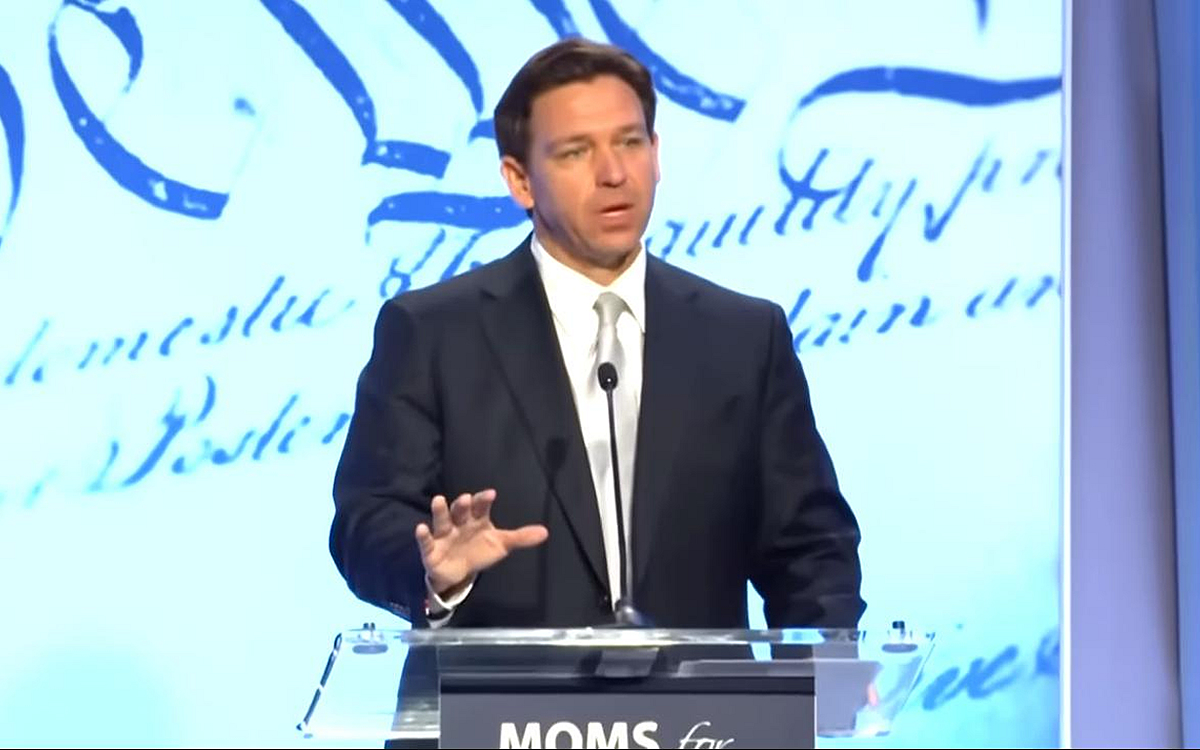Opinions
Florida’s ‘Don’t Say Gay’ laws undermine protections for LGBTQ teachers, students
Measures must be stricken down, enjoined, or otherwise invalidated

Formally entitled the “Parental Rights in Education Act,” Florida House Bill 1557 amends Florida Statute § 1001.42 to add a new subsection 8(c)(3), which provides: “Classroom instruction by school personnel or third parties on sexual orientation or gender identity may not occur in kindergarten through grade 3 or in a manner that is not age-appropriate or developmentally appropriate for students in accordance with state standards.” In May of this year, Florida Governor Ron DeSantis signed House Bill 1069, which has been viewed as expanding H.B. 1557 by requiring that sex education classes in Florida teach that “sex is determined by biology and reproductive function at birth,” and that reproductive gender roles are “binary, stable, and unchangeable.” Among other things, the new bill also broadens the ban on classroom discussions of gender identity and sexual orientation so that it covers pre-kindergarten through eighth grade and prevents employees from using pronouns other than those that correspond with sex assigned at birth. Critics of these laws have labeled H.B. 1557 and H.B. 1069 “Don’t Say Gay” laws. We share these critics’ concerns.
Below, we highlight the potential of these laws to undermine anti-discrimination protections for teachers and students at public educational institutions in Florida and summarize litigation challenging these laws.
I. The Legal Landscape for LGBTQ Anti-Discrimination Protections in Florida
On June 15, 2020, the Supreme Court issued a landmark decision in Bostock v. Clayton County, Georgia, 140 S. Ct. 1731 (2020). In a 6-3 decision, the Court interpreted existing federal law to protect LGBTQ individuals from discrimination in employment and public accommodations by recognizing sexual orientation and gender identity as protected categories under Title VII of the Civil Rights Act of 1964. As a result of Bostock, LGBT individuals who work for an employer with fifteen (15) or more employees, and who have experienced discrimination based on their sexual orientation or gender identity, now have the right to take legal action against their employer by filing a charge with the Equal Employment Opportunity Commission and/or taking their employer to court.
In light of the Supreme Court’s decision, the Florida Human Rights Commission issued a notice that clarified that the agency would now broaden its mandate to include combatting discrimination based on gender identity and sexual orientation. Thus, after Bostock, LGBTQ Floridians, including teachers, gained vital anti-discrimination protections at work and in housing under both federal and state law.
Bostock v. Clayton County has been interpreted to protect LGBTQ students from discrimination as well. For instance, in Grimm v. Gloucester County School Board, 972 F.3d 586 (4th Cir. 2020),the U.S. Court of Appeals for the Fourth Circuit relied on Bostock to hold that disparate treatment on the basis of a student’s sexual orientation and transgender status—in this case, barring transgender students from using school restrooms that align with their gender identity—is considered discrimination under Title IX of the Education Amendments of 1972. Id. at 618–19. These protections are especially important for LGBTQ students in conservative states like Florida; these students may face discrimination on a direct level as well as indirectly from institutions and political players who aim to promote homophobic and transphobic rhetoric and policies.
Unfortunately, the victory represented by Bostock has been overshadowed by H.B. 1557 and H.B. 1069.
II. Harm and Confusion Created by H.B. 1557 and H.B. 1069
While it is too soon to know how H.B. 1557 and H.B. 1069 will impact the application of Bostock, there is cause for alarm. Under Florida law, if a parent raises a concern about compliance with H.B. 1557 and that concern is not “resolved by the school district,” the parent may proceed before a special magistrate or “[b]ring an action against the school district to obtain a declaratory judgment that the school district procedure or practice violates [H.B. 1557] and seek injunctive relief.” Fla. Stat. § 1001.42(8)(c)(7)(b). If the parent prevails in the suit, the court may offer the parent damages and “shall award reasonable attorney fees and court costs.” Id.
Undoubtedly, Florida’s LGBTQ teachers will face greater scrutiny and potential legal obstacles as a result of these laws. As critics have pointed out, these laws’ ambiguity and undefined terms represent a potential minefield for LGBTQ teachers. For instance, Florida law now bans instructing some students on sexual orientation. Would a gay teacher who mentions in class that he has a husband violate this law? Would a cisgender teacher with a nonbinary child be in violation if she referenced her child by their proper pronouns in front of her students?
For transgender and nonbinary teachers, the environment is even more dangerous. H.B. 1069, which went into effect on July 1, 2023, states: “An employee or contractor of a public K–12 educational institution may not provide to a student his or her preferred personal title or pronouns if such preferred personal title or pronouns do not correspond to his or her sex,” with “sex” defined in strictly “biological” terms. Fla. Stat. § 1000.071(1), (3). It is unclear whether this language (i) forbids a transgender or gender-nonconforming teacher from providing the teacher’s own preferred pronouns to students, or (ii) forbids a teacher from providing a transgender or gender-nonconforming student’s preferred pronouns to that student—or both. Ambiguities aside, this provision is likely to force transgender and nonbinary teachers in Florida back into the closet or ban them from teaching in Florida schools altogether. If transgender and nonbinary teachers are prohibited from truthfully representing their identities in front of their students, transgender and nonbinary identities are essentially banished from the classroom entirely.
Already, headlines have been made by teachers who have fallen on the wrong side of these new laws. For instance, the Hernando County School Board placed a fifth-grade teacher in Brooksville, Fla. under investigation for showing her class a Disney film that depicted a gay character. In another instance, an assistant principal in Polk County was told that she couldn’t pass out LGBTQ-inclusive “safe space” stickers because it violated the new legislation. Some teachers have publicly decried that the laws make their jobs nearly impossible and others have decided to quit teaching altogether.
While these laws are new and their impact on Florida’s LGBTQ teachers and other staff is only just beginning to be understood, the socio-political movement that paved the way for this legislation has been decades in the making. In 1977, singer and political activist Anita Bryant led an anti-LGBTQ campaign in Dade County, Florida, targeting housing and employment protections for gay individuals. Bryant was particularly concerned that the ordinance would prevent gay teachers from being fired for their sexual orientation and she argued that gay teachers posed a threat to Florida’s children. Unfortunately, the campaign was a short-term success for anti-LGBTQ activists, culminating with the repeal of a nondiscrimination ordinance. Historians note that this tactic of using the protection of children to restrict LGBTQ rights was seen even before Bryant’s crusade, with the infamous Johns Committee in 1958 targeting and eliminating LGBTQ individuals from Florida schools.
Although Bryant initially won the repeal of the ordinance, her activism spurred LGBTQ mobilization that ultimately successfully countered her bigoted efforts.
III. Lawsuits to Enjoin Enforcement
We are aware of two recently filed cases seeking to enjoin enforcement of H.B. 1557.
First is M.A. v. Florida State Board of Education, No. 4:22CV00134 (N.D. Fla.), a case that was initiated in the U.S. District Court for the Northern District of Florida on March 31, 2022. In M.A., a group of students, parents, and teachers advanced claims arising from alleged violations of the Constitution’s Due Process and Equal Protection Clauses, the First Amendment, and Title IX of the Education Amendments of 1972. On February 15, 2023, District Judge Allen Winsor, a Trump appointee, concluded that the plaintiffs had “not alleged sufficient facts to show standing” and dismissed the case. M.A. v. Fla. State Bd. of Educ., No. 4:22-cv-134-AW-MJF, 2023 WL 2631071, at *1 (N.D. Fla. Feb. 15, 2023). In so holding, the court reasoned that the plaintiffs failed to “allege facts showing any concrete future harm that is fairly traceable to [H.B. 1557’s] enforcement and redressable by an injunction prohibiting that enforcement.” Id. at *2. On March 20, 2023, the plaintiffs appealed the case to the U.S. Court of Appeals for the Eleventh Circuit. See M.A. v. Fla. State Bd. of Educ., No. 23-10866, Dkt. 1 (11th Cir. Mar. 20, 2023). In their appellate briefing, the plaintiffs argue that the district court erred because the plaintiffs alleged sufficient facts to confer standing in the form of “three distinct injuries caused by H.B. 1557”: (i) a chilling effect on speech, (ii) denial of access to ideas and information in school, and (iii) stigma and unequal treatment in schools based on LGBT status. See M.A. v. Fla. State Bd. of Educ., No. 23-10866, Dkt. 38, at 38 (11th Cir. May 31, 2023). As of this writing, the appeal remains pending before the Eleventh Circuit.
Second is Cousins v. School Board of Orange County, Florida, No. 6:22-CV-01312 (M.D. Fla.), which was initiated in the U.S. District Court for the Middle District of Florida on July 25, 2022. The plaintiffs in Cousins were a group of students and parents, as well as a mission-driven non-profit called CenterLink, Inc, who advanced claims arising from alleged violations of the First Amendment and the Constitution’s Due Process and Equal Protection Clauses. On August 16, 2023, District Judge Wendy Berger, also a Trump appointee, dismissed the case for reasons similar to the reasons provided by Judge Winsor in the M.A. litigation. See Cousins v. Sch. Bd. of Orange Cnty., Fla., No. 6:22-cv-1312-WWB-LHP, Dkt. 143 (M.D. Fla. Aug. 16, 2023). As of this writing, the plaintiffs have not appealed the decision.
It remains unclear whether and to what extent these two cases will succeed in enjoining enforcement of H.B. 1557 and H.B. 1069. Settlement discussions are currently ongoing in the M.A. case, and we are cautiously optimistic that the plaintiffs in that case will be able to obtain some form of relief.
Whether through litigation, legislative repeal or some other means, Florida’s recently enacted anti-LGBT laws are harmful and should be stricken down, enjoined, or otherwise invalidated.
Opinions
Navigating employer-sponsored health insurance, care
One in four trans patients denied coverage for gender-affirming care

Even though 86% of transgender Americans have health insurance, one in four reported being denied coverage for gender-affirming care in the 2015 and 2022 U.S. Transgender surveys. These denials can occur when an insurance plan contains a categorical exclusion of gender-affirming care. It is important to note that transgender employees who receive insurance coverage through their employers are entitled to legal protections.
Employers are responsible for ensuring that the insurance plans they provide do not violate any laws, including anti-discrimination laws. In 1983, the Supreme Court ruled that under Title VII of the Civil Rights Act of 1964, employers are legally required to provide employees with equal pay and benefits, including health insurance. This protection now extends to transgender employees after the Supreme Court’s ruling in Bostock v. Clayton County (2020), which clarified that sex discrimination under Title VII includes gender identity discrimination.
Since Bostock, several transgender employees have successfully sued their employers for discrimination because they were denied coverage of gender-affirming care by their employers’ insurance. While employers can be held liable under Title VII, it remains unclear whether insurance companies will be held liable under Section 1557, the antidiscrimination provision of the Affordable Care Act (ACA), in the future.
Most—if not all—courts have ruled that employers can be held liable for choosing insurance plans with categorical exclusions of gender-affirming care. A categorical exclusion is when an insurance plan has a blanket ban of coverage for certain services. Although discrimination cases generally require proof of intent to discriminate, it is not required of transgender employees because categorical exclusions of gender-affirming care are facially discriminatory (i.e. the policy is explicitly and obviously discriminatory in nature).
In Kadel v. Folwell (2024), the Fourth Circuit court considered the Fourteenth Amendment, Title IX, and ACA claims in a consolidated case considering two state health plans: the State of North Carolina’s insurance plans for teachers and West Virginia’s Medicaid program. The Fourth Circuit court held that it is impossible to ban coverage of gender-affirming care without discriminating against transgender people because (1) gender dysphoria is a legitimate medical diagnosis which requires medically necessary treatment; and (2) the services provided under gender-affirming care are also provided to cisgender patients for other medical diagnoses. In short, there is sufficient evidence of discriminatory intent because categorical exclusions of gender-affirming care are facially discriminatory. Under Kadel, the Fourth Circuit also ruled that a policy does not have to explicitly exclude transgender patients. “Rewording the policies to use a proxy,” like sex changes or sex modification, is still facially discriminatory.
Along a similar vein, in Lange v. Houston County (2024), the Eleventh Circuit court found that the Sheriff’s Office’s categorical exclusion of gender-affirming care was a violation of Title VII. Agreeing with the reasoning in Kadel, the court cited a 1991 Supreme Court Case which ruled that proof of intent to discriminate is not needed for facially discriminatory policies. The court also held Anthem Blue Cross liable because third-party administrators in the Eleventh Circuit (i.e., Alabama, Florida, and Georgia) can be held liable as an employer if they make employment decisions as the authorized agent of an employer. However, this decision is unique to the said jurisdictions, and the liability of third-party administrators/insurance providers remains generally unclear. Moreover, the decision is not final because the court granted an en banc appeal, and a panel of all twelve judges re-heard the case in February 2025. The decision after re-hearing remains to be seen.
Recently, Executive Order 14168 and the EEOC’s motion to dismiss its lawsuit against Harmony Hospitality on behalf of a transgender worker prompted concerns over transgender employees’ ability to bring federal discrimination claims. While such concerns are understandable, there has yet been any mandate prohibiting the EEOC from issuing right to sue to transgender individuals. In other words, even if the EEOC may not investigate and file lawsuits on behalf of transgender individuals, it does not bar private parties from doing so. Ultimately, the executive branch alone does not have the power to make changes to the Constitution or any federal statutes. It is up to the legislatures to amend laws and the Constitution, and courts to interpret and rule on constitutionality.
Protections Against Discrimination by Insurers Under Section 1557 Remain Unclear
While employers can be held liable for categorical exclusions of gender-affirming care, employees may be less likely to find relief for legal claims against insurers regarding discrimination on the basis of gender identity. Since Bostock, courts have found insurers liable for denying coverage of gender affirming care under Section 1557 of the ACA, extending sex discrimination to include gender identity. Recent litigation surrounding Section 1557 and the new presidential administration may precede a change in this trend.
In May 2024, the Biden administration issued a final rule implementing Section 1557.It reversed the rule put forth by the Trump administration four years prior, which had revised the Obama administration’s interpretation of the statute. The Biden administration’s final rule defined sex discrimination to include discrimination on the basis of gender identity and sexual orientation. Additionally, under the new rule, a wider swath of insurers and third-party administrators that receive federal financial assistance would be subject to Section 1557.
However, in July 2024, a Mississippi District judge granted a nationwide injunction preventing the Department of Health and Human Services from enforcing the final rule’s prohibition of sex discrimination with respect to gender identity. Additionally, executive orders during the early days of the Trump administration, and guidance from the Department of Health and Human Services that followed, rescinded wide swaths of Biden-era guidance extending sex discrimination protections to include discrimination based on gender identity. It is not yet clear how the new administration’s position on Section 1557 will impact courts’ decision-making regarding insurer liability and the extent of sex discrimination provisions in relation to gender identity going forward.
As the recent history of Section 1557 demonstrates, executive actions may influence the implementation of statutory antidiscrimination provisions, but do not change the law itself. While employers continue to face liability for discrimination towards employees seeking insurance coverage of gender-affirming care under Title VII, some protections remain on less certain ground as the United States enters a new presidential administration.
Ting Cheung, Luke Lamberti, and Neha Sharma are with Sanford Heisler Sharp McKnight.
Commentary
A conversation about queers and class
As a barback, I see our community’s elitism up close

In the bar, on the way to its now-Instafamous bathrooms, there’s a sign that reads, “queer & trans liberation means economic justice for all.”
I remember seeing that sign the first week the bar opened, and ever since I often find myself reflecting on that message. I stand fully in agreement. That’s why laws protecting queers in the workplace are essential, for far too often we are targeted otherwise. It’s also why I love working at the bar, since it provides opportunities for queers from all over the spectrum to earn a living. At a time when I gave myself space to pursue art, it was the bar that enabled me to do so.
It’s one thing to support the LGBTQ community in spirit, but that spirit means jack in a capitalist society if viable economic opportunities don’t exist. Speaking of jack, there’s a fellow barback named Jack who I fangirl over often. Jack is a decade younger than me, but damn I wish I had his sex appeal at his age (or any age, for that matter). He also has a mustache that easily puts mine to shame.
Jack not only agrees but took things one step further. “Economic inequality IS a queer issue,” he told me, “especially as we move into the most uncertain period of American politics I have ever lived through, it is apparent our identity is now a fireable offense.”
Uncertain is right. We’re fresh off the heels of a trade bonanza, one caused for literally no reason by our current commander in chief. Yet there emerged a strange division when discussing the trade war’s “unintended” consequences. For working class comrades like Jack and myself, we’re stressed about increasing prices in an already tough economy. But the wealthier echelons of our country had something else on their mind: the spiraling stock market. This alone highlights the story of our economic divide, where the same event produces two separate concerns for two distinct classes.
This is not to say the stock market is not important, but sometimes the media forget many Americans don’t own stock at all, including a vast majority of people between 18 and 29. In fact, according to Axios, the wealthiest 10 percent of Americans own 93 percent of the entire stock market, with the richest 1 percent holding $25 trillion — that’s right, trillion with a “t” — in market value. So, when the president reversed course on trade, it was less about high prices hurting everyday Americans and more about the dent created in the wealth of the wealthiest. And I’ll admit: that bothers me a lot.
If there is any takeaway from Trump’s trade war, it should be this: Economic inequality is the highest it has been in decades and, if left unchecked, will destroy the fabric of our country. We are steadily moving toward oligarchy status—if we’re not there already, that is—and it seems to grow worse with each passing year and administration. But in a city of D.C. gays who often skew corporate, I wonder: Are we all on the same page here?
After becoming a barback, I have my doubts. From questions about what else I do, to comments encouraging me to work hard so that I can be a bartender one day, I quickly learned the gay world is not too fond of barbacking. Barebacking, sure, but not barbacking. And hey, I get it—we’re not the alcohol hookup at the bar. Still, we are part of the service industry, and while some people are incredibly kind, you’d be surprised at how many turn up their noses at us, too.
Recently, I’ve come to realize my class defines me as much as my orientation does, if not more. Naturally, when you come from a rough neck of the woods like I do, it’s easy to feel out of place in a flashy city like D.C., which Jack noticed, too. “Anyone from a working class background could testify to that,” he said. “I don’t really know anyone from true upper class backgrounds, but I’d imagine their experience is one that leans into assimilation.”
Assimilation is a key word here, for admittedly gays love to play with the elite. Often, we don’t have children, meaning more money for the finer things in life, but that also means we may not think about future generations much, either. I’ve written before that our insecurity growing up has us ready to show the world just how powerful gays can be—power that comes in trips to Coachella and Puerto Vallarta, or basking in the lavish houses and toys we own. There’s already a joke that gays run the government, and corporate gays kick ass at their jobs as well. So, given the choice between fighting inequality and keeping a high-paying job, I must admit I have a hard time seeing where D.C. gays stand.
Admittedly, it worked out in our favor before, given that many corporations catered to our economic prowess over the years. But look at what’s happening now: Many corporations have kicked us to the curb. Protections are being stripped from queers, particularly for our trans brothers and sisters. Law firms are bowing down to Trump, offering hundreds of millions in legal fees just for their bottom line. All of this will hurt both queers and the working class in the long run, so again I ask: Corporate gays, where do you stand? Because if you remain complicit, that’s bad news for us all.
I don’t want to sound accusatory, and I hate being a doomsday type, so allow me to end this on a better note. Strength is not about celebrating when times are good. Arguably, true strength emerges when times get tough. These are tough times, my friends, but that also makes now the perfect opportunity to show the world just how strong we are.
At a time when the world is pressuring us to turn our backs on each other, we must defy them to show up when it counts. Corporate gays—now more than ever, at a time when the economy is turning its back on queers, we need you. We need you to stand up for the queer community. We need you to make sure no one gets left behind. We need you to show up for us, so that we can show up for you, too.
Ten years ago, the economy didn’t turn queer out of nowhere. The economy turned queer because we made it turn queer.
And if we did it once, surely we can do it again.
Jake Stewart is a D.C.-based writer and barback.
Opinions
On Pope Francis, Opus Dei and ongoing religious intolerance
Argentine-born pontiff died on Monday

“Good Friday” set the stage for Saturday’s anti-Trump/MAGA “Hands Off” protests serving as a timely lead-in to binge-watching Alex Gibney’s two-part HBO political documentary, “The Dark Money Game” on Easter Sunday. In “Wealth of the Wicked,” nefarious Opus Dei —Svengali Leonard Leo strategically seduces politically disappointed Catholic Federalist Society billionaires into subsidizing a scheme to ‘pipeline’ malleable conservative judges to take over the Supreme Court and overturn reproductive rights.
A key victory for “Operation Higher Court” came in 2010 when SCOTUS ruled 5-4 in Citizens United v Federal Election Commission, that corporations and unions have the same First Amendment free political speech rights as individuals — as long as their unlimited cash donations go to 501 c(4)’s or Super PAC slush funds and not directly to candidates. Twelve years later, in 2022, they got their payoff with the overturning of Roe v Wade by Leo-promoted Catholic justices.
But Leo’s political conniving is not the only exploitation of moral corruption. The documentary exposes conservative Christians too.
Gibney’s anti-hero is a former rabid anti-abortion lobbyist named Rev. Robert Schenck. He tells of turning to a fellow conservative in Cleveland, Ohio after Trump won the Republican presidential nomination in 2016 and asking: “Are we really going to do this? We’re going to choose this man who’s inimical to everything we believe?” The other evangelical replied: “I don’t care how bad he is. He’s going to get us the court we need.’”
Schenck explains the unholy alliance between Christian conservatives and Big Business. “Whenever you talked about government regulation, the argument was eventually — ‘these same characters who control my business are going to start trying to control your church. So, it’s in your best interests that we defang this monster’ — and that brought a lot of religious conservatives over.”
And there’s this: “We have a little aphorism built on a Bible verse: ‘The wealth of the wicked is laid up for the righteous.’ So, yeah, let’s baptize the billionaires’ money. We can do that — and it eventually brought together this alliance.”
Schenck later reveals an intense epiphany that resulted in regret for how much harm he caused. Not so for Leo.
This is an excerpt from Gareth Gore’s comprehensive book Opus, for Rolling Stone Magazine:
“DURING THE DONALD TRUMP YEARS, conservatives — led by Leonard Leo — took control of the Supreme Court … At one Federalist Society event, his good friend Supreme Court Justice Clarence Thomas jokingly referred to Leo as the third most powerful man in the world, presumably behind the pope and the president of the United States.”
On Monday morning, Pope Francis died. I liked this pope, compared to the others. I covered Creating Change during the AIDS crisis when author Paul Monette delivered his brilliant, scathing denouncement of the Catholic Church, then unexpectedly ripped up a portrait of Pope John Paul II. Pope Benedict XVI was just crotchety cruel. But Pope Francis — named for St. Francis of Assisi — had that big smile and genuinely seemed to care about migrants, the vulnerable and the marginalized — like us. He even used the word ‘gay’ instead of ‘homosexual.’
Pope Francis’s reply to a question about a Vatican “gay lobby” on a flight from Rio de Janeiro to Rome made global news. “If a person is gay and seeks God and has good will,” he said in 2013. “Who am I to judge? We shouldn’t marginalize people for this. They must be integrated into society.”
What did this mean? Welcoming inclusion into a family that officially considers us ‘intrinsically disordered?’
And then there was Pope Francis’s interaction with Juan Carlos Cruz — a whistleblower in Chile’s clerical sex abuse scandal.
“He said, ‘Look Juan Carlos, the pope loves you this way. God made you like this and he loves you,'” Cruz told The Associated Press.
Meanwhile the Catholic Church Catechism affirmed, “this inclination, which is objectively disordered, constitutes for most of them a trial.”
Ergo, a behavioral choice.
Therein lies the problem.
LGBTQ people are seen largely as individuals with sinful same sex sexual ‘inclinations.’ So when the pontiff touted ‘the equal dignity of every human being,’ and rebuked Vice President JD Vance with the ‘Good Samaritan’ parable, whereby love “builds a fraternity open to all, without exception” — we are still the exception.
Francis was all also human — having to apologize at one point for using a gay slur. But what of the bigger things like, did he know about the Opus Dei takeover of the U.S. Supreme Court when he chastised Vance about deporting migrants? Did he know that the Archdiocese of Los Angeles agreed to pay $880 million to 1,353 people last October, who allege they were victims of clergy sexual abuse? With a previous payment of $740 million, the total settlement payout will be more than $1.5 billion dollars. Is Leo chipping in to replenish that?
And it’s not over. Earlier this month, Downey Catholic priest Jaime Arriaga, 41, was charged with several counts of child sexual abuse which allegedly happened when he was serving as a transitional deacon at the Our Lady of Perpetual Help Church.
Longtime U.K LGBTQ+ activist Peter Tatchell — who’s campaigned against Catholic homophobia for 58 years — says Pope Francis’ legacy is complicated.
“I extend my condolences to Catholics worldwide on the passing of Pope Francis. While we often disagreed on issues of LGBTQ rights, I acknowledge his more compassionate tone towards sexual minorities. His recent moves to allow blessings for same-sex couples, albeit with limitations, signaled a small but significant shift in Church doctrine,” Tatchell said in a statement.
“However, for millions of LGBT+ people globally, the Catholic Church remains a force for discrimination and suffering. Under his leadership, the Vatican continued to oppose same-sex marriage and trans rights. Catholic bishops lobbied against the decriminalization of homosexuality in many parts of the world. The Vatican still upholds the homophobic edicts of the Catechism, which denounces the sexual expression of same-sex love as a ‘grave depravity’ and ‘intrinsically disordered.’ Francis’s legacy is, therefore, a mixed one — offering some progress, but leaving deep-rooted inequalities largely intact.
“The struggle for LGBT+ equality against a homophobic church must continue. We urge the next Pope to go further — to end the church’s support for discrimination, both within the faith and in the wider society.”
-

 Federal Government3 days ago
Federal Government3 days agoHHS to retire 988 crisis lifeline for LGBTQ youth
-

 Opinions3 days ago
Opinions3 days agoDavid Hogg’s arrogant, self-indulgent stunt
-

 District of Columbia3 days ago
District of Columbia3 days agoD.C. police seek help in identifying suspect in anti-gay threats case
-

 Virginia3 days ago
Virginia3 days agoGay talk show host wins GOP nom for Va. lieutenant guv










